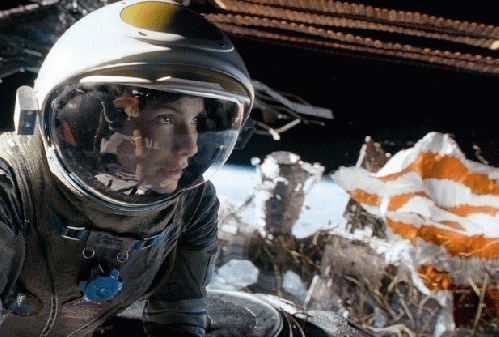Readings for First Sunday in Lent: GN 2:7-9, 3:1-7; PS 51: 3-6, 12-13, 17; ROM 5: 12-19; MT 4: 1-11.
Today is the first Sunday of Lent. A week ago, Hollywood presented its 2014 Academy Awards. Alfonso Cuaron's "Gravity" won seven Oscars. I think his story and today's reading about Jesus' desert retreat are connected.
Lent actually started last Wednesday when many of us put ashes on our forehead to remind us of our approaching death. All of us, the ashes told us, come from the dirt and are rushing headlong towards the grave, whether we consider ourselves "believers" or not. Our world (at least for us as individuals) is ending. That's simply a law of nature -- as inescapable as gravity. It can't be avoided. With time running out, Lent reminds us, the moment to change -- to appropriate our basically divine nature -- is now. Jesus' vision quest in the desert shows the way.
So does "Gravity." In fact, it's possible to see the film as mirroring the experience of Jesus during his own "Lent" in the desert depicted in this morning's gospel selection.
To begin with, both stories are completely symbolic. Both have their protagonists reliving the history of their people. Both show us the path to liberation. It leads from self-centeredness to God-consciousness. As such, both the account of Jesus in the desert and of Sandra Bullock's character in "Gravity" represent summonses to either grow up here and now or suffer the consequences.
Think about "Gravity" in those terms. Here's how the film's publicity describes the plot:
"Director Alfonso Cuaron's Gravity stars Sandra Bullock as Dr. Ryan Stone, a scientist on a space shuttle mission headed by astronaut Matt Kowalsky (George Clooney), a talkative, charismatic leader full of colorful stories that he shares with his crewmates as well as mission control. As the two are on a space walk, debris hits the area where they are working, and soon the pair finds themselves detached from their ship and stranded in space. While figuring out what steps they can take to save themselves, Stone grapples with a painful past that makes her consider giving up altogether."
Without giving too much away, the film can be understood as mirroring the current plight of Mother Earth, the United States and the human species. It's about our highly technological and artificial way of life and its inevitable destruction by the very laws of nature. It reminds unaware, "spaced out" people to "return home" and live in accordance with our true identity as earth creatures respectful of nature's laws.
In "Gravity," Sandra Bullock plays that spaced out American I mentioned. She's an astronaut. As a medical engineer, she's a trained healer whose job in NASA is to maintain a basically unsustainable way of life in outer space. To begin with, however she's totally saddened and distracted by her personal problems. Specifically, she's still in mourning for her lost daughter who died from an unexplained fall at the age of four. Interestingly, her daughter died conforming to the law of gravity which Dr. Stone's "mission" requires her to defy.
The point is that Dr. Stone's mission (like her daughter's brief life) is doomed by inescapable natural laws. Entropy causes the systems she maintains to run down and demand periodic, extremely costly "missions" like the one she is on. At the same time inertia insures that the inevitable waste produced by the space enterprises will double back to seal the projects' doom according to the law governing colliding bodies.
In that situation, Dr. Stone becomes the image of an alienated woman called by circumstances to wake up and accept her true divine nature as a healing goddess -- as the embodiment of Mother Earth. As such she must return to the larger Divine Mother; she must return to earth and appropriate her own vocation to embody that Mother's presence.
Think about it: the Bullock character is a "Stone" -- the earthiest identification possible. She's a doctor. She's an astronaut. In all three identities, she's out of her element. She's floating in a weightless atmosphere that has caused her to deny her gravity-governed essence. In addition, like the earth itself, her oxygen supply is threatened. And that, of course, is painful and repulsive. Or as she herself puts it, "I hate space."
"Gravity's" story unfolds to display Dr. Stone's healing efforts to reconnect with earth despite the obstacles working against her. In the process, like Jesus in today's Gospel, she shows us all the way home from our own alienation and destructive way of life.
Dr. Stone's way home involves not only using the personal tragedy of her daughter's death to work in her favor. It also means crossing the Ganges and being blessed by the Buddha. She must also overcome her own ethnocentrism and xenophobia relative to her country's designated "enemies" (the Russians and Chinese). Her return would have been impossible without an international space platform, a Russian Soyez module and a Chinese Shenzhou space capsule.
Finally, Dr. Stone needs to be "born again," reliving the entire evolutionary process taking her through human astral origins to earth where she's plunged into deep baptismal waters. With great effort, she throws off her old identity in the form of her astronaut's survival gear. In the process, she encounters fish, amphibians and other pre-human life forms in the evolutionary chain. Finally freed of her past, on all fours, Dr. Stone emerges onto Eden's shore. As a reborn Eve -- as Mother Earth -- she straightens up and walks forward into a new life. Her final words in the film are "Thank you."
(Note: You can view every article as one long page if you sign up as an Advocate Member, or higher).






